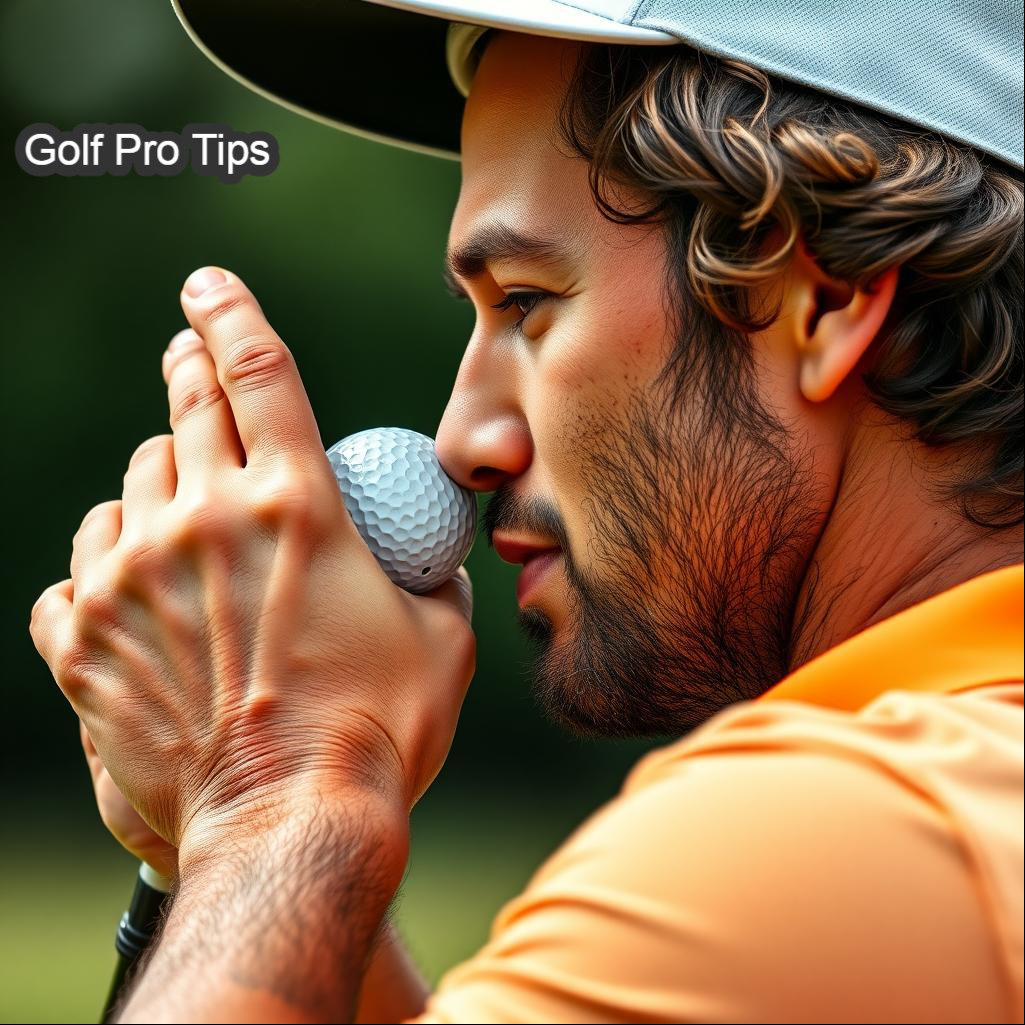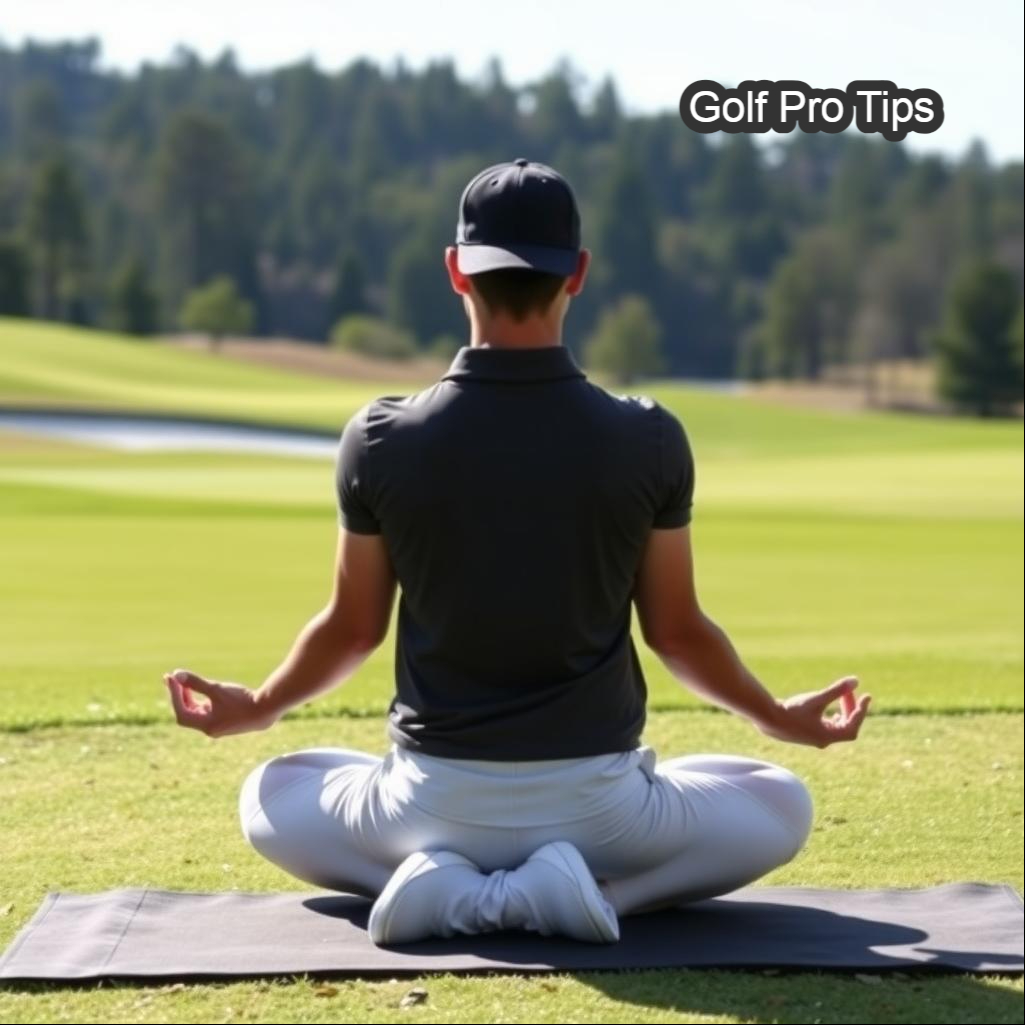Top 9 Mental Golf Tips for Beginners : Focus, Confidence & Calm

Table of Contents
Key Takeaways
- Mental obstacles such as anxiety and self-doubt are familiar foes for the novice golfer. Developing a way to combat these emotions is an essential step to improving your game! Understanding mental golf tips and acknowledging these feelings is the first step to beating them.
- Create a detailed pre-shot routine—one that includes mental and physical aspects. This will build confidence, minimize panic and provide the comfort of familiarity so that you can concentrate on executing your best shot each time.
- Learn and practice visualization techniques to mentally prepare yourself for the shots you need to take. Visualize positive results. Visualizing positive outcomes is a great way to instill confidence and clarity in your plan of attack to each hole.
- Develop a positive approach to failure by viewing errors as chances to learn. Acknowledging that mistakes are unavoidable will allow you to be a more upbeat player by freeing you from the fear of failure.
- Key Takeaways Stop thinking about every shot! Focus on the right things by setting process-oriented goals rather than worrying about your total score. These will greatly serve to improve your focus and play your best game.
- Lastly, aim for fun and not just competition. Building camaraderie with your golfing peers and enjoying the scenic nature of the game will go a long way in improving your holistic golf experience.
Mental golf tips for beginners are all about developing the killer mindset that’s going to help you play your best out on the course. Building mental toughness will benefit the player with anxiety issues to manage their nerves, stay present and focused, and make better decisions.
Easy strategies such as visualization, diaphragmatic breathing, and positive affirmations can help a new player’s game tremendously. Setting achievable goals and creating a pre-shot routine can build confidence and predictability.
Learning the mental game of golf will not only help you play better, it will help you love the game more. By embracing these strategies, beginners can overcome hurdles more easily and cultivate a more fulfilling journey in the sport.
This guide will explore essential mental golf tips that can improve your game and support your growth as a golfer.
Understanding the Mental Game
Golf is just as much a mental game as it is a physical game. For new players, the mental game is often the hardest part of the game to traverse. Issues like performance anxiety, a loss of confidence, and difficulty staying focused for 18 holes often plague players.

In fact, these destructive and unproductive thoughts can greatly affect one’s overall enjoyment and performance, so dealing with them properly is of utmost importance.
What Mental Challenges Do Beginners Face?
Inexperienced players underperform in the tournament environment due to the pressure that builds from the stakes, resulting in performance anxiety. The never-ending cycle of comparison to other golfers, especially if done publicly, can quickly tear down self-esteem and confidence.

The fear of failure can lead to overthinking, which compromises shot mechanics and performance. Identifying these challenges provides a foundation for addressing them.
How to Build Resilience After Bad Shots
So, after a bad shot, executing a recovery strategy might just be the most important next step. There’s research showing that positive self-talk and affirmations replace negative thoughts and feelings, and help golfers refocus.

Having a go-to mental checklist to focus on can shift focus back to the next shot and reduce the tendency to overfocus on mistakes.
The Importance of Mental Toughness in Golf
Fostering resilience is key to dealing with the game’s inevitable peaks and valleys. When you begin to see challenges as opportunities for growth, a much more positive outlook and mindset will emerge.
Building mental stamina helps golfers stay calm and focused no matter how long their rounds last, which is crucial for peak performance.
In order to gain control over their thoughts and emotions, beginners need to practice awareness of their self-talk and nonverbal behavior. Techniques such as visualization allow for effective mental rehearsal and ensuring that you know the ego’s role avoids unnecessary pressure.

Having the understanding that it’s not realistic to be focused for 18 holes helps set a more realistic expectation.
Developing Focus and Concentration
In fact, in golf, the mental golf game is even more important than the physical. Developing focus and concentration is a key skill for beginners to help them maximize their effectiveness out on the course. This includes mental golf tips to create strategies for remaining in the moment and recognizing distractions.
Techniques to Stay Present on the Course
Incorporating mindful breathing exercises like these can help bring golfers’ awareness to the present moment. By taking a few deep breaths before each shot, you reset your mind and focus your energy on what you want to do.

Mindfulness practices, like active attention to physical sensations, help golfers remain present with every stroke. Develop a mental trigger to enforce the use of 100 percent of your concentration on the one shot at hand. This practice helps distance it from your past and future strokes.
How to Maintain Concentration Amid Distractions
Having a pre-shot routine is one of the best ways to eliminate all that outside noise and distractions, so you’re able to concentrate. By visualizing the target, you cement this concentration, ensuring that the shot feels more within your reach.
Having clear goals for each shot is another way to stay focused, especially when you do get distracted. When these techniques are practiced with basic shots, such as putting, it helps establish the confidence when faced with tougher plays.
The Role of Self-Talk in Building Confidence
How self-talk affects confidence. Affirmations are a great way to build self-confidence before—and even during—a round. By confronting pessimistic thinking with positive self-talk, we can create an environment for a confident attitude to thrive.

Keeping track of what you say inside your head will increase your concentration and self-assurance. This is in agreement with golf legend Jack Nicklaus’s conviction that the mental game is where it’s at.
Establishing a Pre-Shot Routine
Developing a detailed pre-shot routine is a key skill for improving your consistent golf on the course. This routine should integrate mental golf tips and physical aspects, ensuring total mental preparation leading up to each golf shot. The idea is to create a routine that you can trust, eliminating a little bit of the unknown and setting yourself up for greater success.

Why a Pre-Shot Routine Matters
Having a clear routine will help take away a lot of that anxiety and help build confidence. With a sense of comfort and familiarity with your process, successfully executing shots will be easier. Maintaining a strict routine is another way to tell your brain that it needs to get in the zone.
Now you’re primed for some great execution!
Steps to Create a Consistent Routine
Start by identifying concrete steps like checking alignment and taking a few deep breaths. The more you practice your routine, the more muscle memory takes over, and it will come to you naturally.
Continue to tweak your routine based upon how you perform on the course to make it your own.
Incorporating Mindfulness into Your Routine
Mindfulness practices, like taking a few deep breaths, can improve your pre-shot routine. Pay attention to the weight of your body and club, and feel free to practice visualization to mentally plan out your shot.
This quick practice will help you to really commit to your shot and target. Successful golfers such as Annika Sorenstam have shown that this routine can be effective through their own routines.
Visualization Techniques for Success

Visualization is an incredibly powerful tool for athletes, especially for golfers and novices alike. This mental golf tip helps players focus on the target for each shot, improving performance and developing confidence. By imagining positive results, golfers can enhance their mental preparation strategy, lower their nerves, and execute better on the golf course.
How Visualization Enhances Shot Execution
- Improve shot execution with visualization. To visualize your shot effectively, first picture what you want your shot to look like. Picture the ball sailing through the air and dropping exactly where you want it to go. This process builds a mental blueprint to inform physical execution.
Then start visualizing the entire hole, from tee to green, as part of your mental golf preparation strategy. This big-picture perspective offers the insights necessary for making smart golf decisions, guiding you to choose the ideal strategy for every shot. Reinforcement through repeated visualization further cements these mental golf tips, helping the brain connect successful shots with confidence.
Practicing Mental Rehearsal Off the Course
Practice mental rehearsal off the course. Find time away from the course to visualize your strategy. This practice can recreate competitive scenarios, mentally getting you used to the competitive pressure of a tournament.
Take time to reflect on past rounds, pinpointing where you can improve, and imagine yourself making those changes. This practice does more than just prepare you; it helps you develop a greater awareness of your game.
Visualizing Your Strategy for Each Hole
Visualizing your strategy for each hole is crucial. Visualize your strategy for each hole in manageable segments. Visualizing your strategy gives you the ability to plan your attack.
Take into account environmental factors like wind and terrain, and start to visualize how these elements affect your shots. Proactively identify problems you might encounter and plan ways to overcome them through visualization.
This forward-thinking strategy goes a long way towards eliminating surprises while on-course.
Managing Emotions and Anxiety

Managing emotions and anxiety are crucial for beginner golfers seeking to enhance their performance on the course. Utilizing golf psychology tips, players can create personalized coping strategies and learn to identify anxiety. When facing tougher mental challenges in the game, self-compassion will better equip players to handle these obstacles.
Overcoming Performance Anxiety as a Beginner
In order to overcome performance anxiety, the first step is figuring out what causes it — competitive pressure, fear of judgement, etc. Once identified, deal with these triggers head on. Relaxation techniques, including deep breathing exercises, can help you feel much more relaxed and ready to make a great swing.
By shifting your focus to the process of playing—for example, your grip or stance—rather than the outcome, you can reduce the pressure.
Strategies to Control Thoughts During Play
In fact, negative thoughts are the fastest way to ruin a round. Try thought-stopping measures, like picturing a stop sign, to help you refocus when these thoughts arise. Positive affirmations, such as “I am strong,” build a successful mental state and can be used on the course.
Developing a personal mental mantra, like “focus” or “stay in the moment,” assists in combating wandering thoughts and maintaining concentration.
Accepting Mistakes and Moving Forward
Mistakes are inevitable on the golf course and should be welcomed in as a learning experience. Create an emergency recovery plan—similar to the deep breath and resetting your feet—to clear your head and recalibrate after an error.
Learning to forgive yourself is key practice—even big-time pros don’t hit every shot.
Focusing on One Shot at a Time
In golf, being able to take it one shot at a time is crucial for a focused game. Moving from process to performance, this beginner’s mindset helps novices harness their mental energy on the here and now, resulting in improved performance. To build this habit, you’ll need to train your mind with effective golf psychology tips that encourage thinking one shot at a time.
Don’t get distracted by last year’s bad golf shots or next year’s prospects! For example, when over a putt, the ability to release prior errors increases your odds of making a great golf shot at a much higher level. Dividing the game into smaller, digestible tasks makes staying focused a lot easier.
Instead of feeling daunted by the entire round, treat each shot as an individual challenge. This mental golf tip is particularly effective in calming nerves and increasing performance. Focus on your grip, stance, and alignment with every shot, rather than worrying about your final score.
The Power of Process-Oriented Goals
We need to focus by setting specific, process-oriented goals for each round, which is a key skill in golf psychology. Emphasizing better processes over short-term results encourages a positive mental attitude. Recognizing these smaller wins—whether it’s finally striking an impressive drive or making a short-range putt—keeps motivation high and momentum in your favor.
Techniques to Stop Overthinking Your Swing
These mindfulness practices are proven to greatly diminish the tendency to overthink swing mechanics, which is a common golf psychology issue. By focusing on the feel of the swing, instead of the mechanics, you create an easier path to execution. Mental golf tips like visualizations make the process less complicated before each shot, allowing you to focus more on the present.
Letting Go of Past Mistakes for Better Performance
Creating a mental preparation strategy to let go of previous errors is key. Let go of the last golf shot and realize that the next one is always a fresh start. Taking some deep breaths will help refresh your mind and clear away any distractions, allowing for a focused game on making the next shot.
Enjoying the Game of Golf
Golf is not just an escape from skill—it’s a quest to improve oneself while having fun. When you change your perspective to making happiness on the course your priority, you set the foundation for a much more enjoyable game.
Stop looking at every round like it’s a competition. Reconnect with the beauty and serenity of the course, the excitement of the swing, and the happiness that comes with being in nature!
Embracing the Joy of Golfing
Learning to love nature will help you play your best golf. Take in the beautiful lush greens and peace of nature that envelops you.
Reward yourself when you do something well, even if it’s making that long putting putt or working on your swing mechanics. Meeting other golfers can profoundly enhance your experience.
Share your stories, tips and laughs to get everyone in the golfing spirit to win a prize!
How to Tackle Frustration Effectively
Learning is a process and frustration comes with that territory. Understanding this will allow you to mitigate challenging situations.
When you’re feeling frustrated, try taking a step back—five minutes or even just five seconds. Practicing mindfulness techniques, like deep breathing, will get you in a better frame of mind.
Focusing your efforts on what’s going to bring about the best results helps you stay upbeat.
Creating a Positive Attitude on the Course
Developing a winning attitude is crucial. Working on what you can control—such as your mindset and attitude towards each shot—is the key to cultivating a positive mindset.
Step 5: Play with golfers who are encouraging and help you build your confidence. Using humor helps take the tension out of frustrating times, and what could be unfortunate or annoying becomes a shared experience.
Preparing for Competitive Play
To succeed as a competitive level golfer, a comprehensive mental preparation strategy is key. Begin with understanding what tournaments require, and then create a detailed plan that addresses both physical preparation and essential golf psychology tips for the mental golf game.
Essential Tips for Competitive Golf Events
Having a good idea of the course layout before you arrive will save you strokes. If you are able to, walk through the course and do your best to make note of hazards and the ideal angles for approach shots.
So, set goals that are challenging, but realistic! Shift your mindset to focus on the things you can actually control, prioritizing your swing mechanics or course management over perfectionist scoreboard fears.
Develop mental resilience techniques, such as positive affirmations, to help you feel more comfortable under the competitive spotlight.
How to Transfer Skills from Practice to Play
To build a sense of familiarity, you’ll need to structure your practice routine to closely reflect competitive scenarios. Include drill work under pressure, like drills against a shot clock.
Third, practice, practice, practice. Sometimes getting out on the field is nerve-wracking all on its own, so consistency is key.
After each practice session, think critically about what went well and what you need to work on, so you can make focused edits.
Entering ‘The Zone' During Competitions
Knowing what your individual triggers are that help you to focus and concentrate is important to reach peak performance. This can include a certain warm up regimen that cues your brain it’s showtime.
Use visualization methods to envision yourself making great shots and breathing techniques to keep you relaxed and focused.
Create a consistent routine before competition that conveys preparedness, allowing for a smoother entry to what would be ideal performance.
Conclusion
As you might have guessed, golf isn’t all about the swing and the putt. It’s a mental game, and that’s what can really transform your performance. Maintaining concentration and keeping your head cool are extremely important.
Routines and visualization A few simple routines will add distance to your confidence factor. Focus on one stroke at a time, and don’t forget to have fun along the way.
By making these mental tips a regular practice, you will find that you are playing better, enjoying yourself more, and experiencing all the wonderful things golf has to offer. Enjoy the journey and keep a good attitude.
Looking to improve your mental game? Begin using these mental golf tips for beginners right now. Be it on the course or at the driving range, every experience is an opportunity to improve. So, continue to swing hard mentally, focus, and have fun with each round. Your game is ready to take its next step.
Frequently Asked Questions
What is the mental game in golf?
The mental game in golf encompasses your attitude and mental golf tips that significantly influence your play. It emphasizes concentration, emotional control, and visualization, which are essential for maintaining a clear mind and complete focus as you navigate through 18 holes in your next round.
How can beginners develop focus on the golf course?
How can beginners develop focus on the golf course? Minimizing distractions and implementing mental golf tips, along with a calm routine before each golf shot, are effective ways to stay focused.
What is a pre-shot routine, and why is it important?
A consistent pre-shot routine is a key skill that helps you get in a groove, builds confidence, and aids in mental preparation for your next round.
How can visualization techniques improve my golf game?
This is what visualization techniques are all about—picturing the successful golf shot before you hit it. This mental golf tip builds confidence, aids in course management, and prepares you for all the different scenarios you might encounter on the course.
How do I manage emotions while playing golf?
You can learn to manage your emotions better through self-awareness and breathing exercises, which are key skills in golf psychology. Acknowledge those emotions, breathe deeply, and concentrate on your next shot to maintain a focused game.
Why is it important to focus on one shot at a time?
Breaking the round up into bite-sized chunks is one of the essential golf psychology tips that helps you avoid feeling overwhelmed while maintaining a clear mind. This approach allows you to focus deeply on one golf shot at a time, maximizing your chances of executing each shot effectively.
How can I enjoy golf more as a beginner?
Enjoy the process of learning, and most importantly, know that golf is supposed to be fun and enjoyable!
This article contains affiliate links. If you purchase through them, I may earn a small commission at no extra cost to you. See our Affiliate Disclosure.






